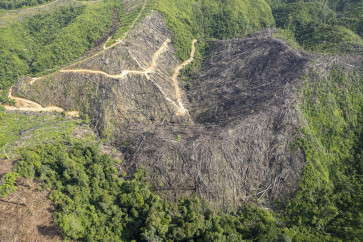Popular Reads
Top Results
Can't find what you're looking for?
View all search resultsPopular Reads
Top Results
Can't find what you're looking for?
View all search resultsThe story of a marginalized group
A fairly large part of Aceh society feels ill-at-ease with the presence of transvestites
Change text size
Gift Premium Articles
to Anyone
A
fairly large part of Aceh society feels ill-at-ease with the presence of transvestites. Religious circles even link them to the fable of Sodom and Gomorrah, a biblical story about the destruction of the towns because of their moral decadence, as indicated, among other things, by the emergence of transvestites, homosexuals and lesbians.
Up to now, the story has often been told in public. Consequently, a negative image of lesbians, gays, bisexuals and transgender individuals, known as LGBT, has been formed.
Edy Saputra alias Echa, a transvestite and director of Violet Grey, an organization backed by transsexuals and gays in Aceh, said waria (transvestites) had always been discriminated against. Violet Grey is fighting for equal rights for the LGBT community in all fields.
“We have an agenda and programs to promote the fact that transvestites, lesbians and homosexuals are part of our society, and share the same rights,” Echa said. She added that people continued to perceive transvestites negatively, mainly due to the stereotyped notion they constituted a public disgrace.
This arbitrary public view caused lesbians, gays, bisexuals and transgender individuals to become a marginalized group in society and join forces to form the association. “Transvestites are considerably discriminated against and ridiculed by people with dissenting views about LGBT. Moreover, Aceh, as a region applying Islamic sharia law, has not yet accepted them as part of society,” Echa said.
Lucy, a women’s activist in Aceh, described the public attitude toward transvestites as ambiguous. Sometimes people appear to accept them but, on the other hand, they also object to their presence.
“Many people seem to have no problem with transvestites individually but they still can’t consider their fellow citizens as regular people,” Lucy said.
“There will be mixed reactions [when people see transvestites]. Some will just smile, others will laugh or throw insults, and others will even tease them for fun,” Lucy noted. Such reactions cause transvestites to feel awkward in the community and in social settings. As a result, they lose their self-confidence when they are trying to interact.
According to Tgk. Faisal Ali, secretary-general of the Aceh Ulema Association, Islam does not recognize the existence of waria. “Islam knows no transvestitism. What is known is only one with a behavioral deviation called khuntsa. In Islam, khuntsa is recognized as a God-created being,” Faisal Ali said.
Waria, in Faisal Ali’s view, are men trying to look like women by wearing female clothing and behaving like the opposite sex. Such people are seen as violating God’s will by attempting to change their appearance and behavior, instead of feeling grateful for God’s blessings.
“Such people need religious guidance so that they will return to normal, as willed by God,” Faisal added.
Unlike the ulema group, Rini from the Indonesian Women’s Commission in Aceh saw the presence of waria in the province simply as an indication of Aceh’s similarity to other regions. Many Acehnese feel embarrassed as they realize that Aceh has its own group of LGBT.
“Many people are ashamed of the existence of transvestites, yet they are never embarrassed by the crimes committed by embezzlers, who have obviously inflicted losses on the Aceh community,” Rini said.
She said the Acehnese always claimed that Aceh, as a region applying Islamic sharia law, should not allow any type of discrimination. Everything should be based on sharia rules, and anything opposed to the rules should not be regarded as part of Aceh.
”In fact, transvestites in Aceh were born and brought up in Aceh. They deserve the same rights as other citizens of Aceh,” Rini pointed out.










